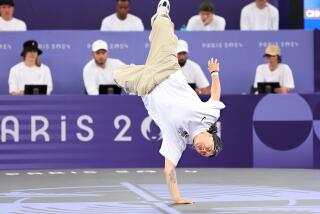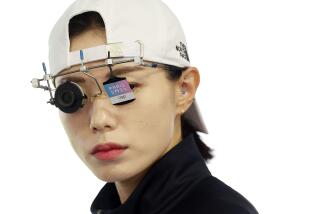Kim Yuna coasts to gold medal in women’s figure skating
Reporting from Vancouver, Canada — They already called her “Queen Yuna” in South Korea.
And her omnipotent reign over the women’s figure skating world officially began in the Olympic women’s figure skating final Thursday night.
Kim ended a streak of three Olympics that had not been kind to the women’s figure skating favorite, instead becoming the first South Korean to win a figure skating medal of any color.
Michelle Kwan of the United States had fallen short of the gold medal she was expected to win in both 1998 and 2002, as Irina Slutskaya of Russia did in 2006.
So here was Kim, who began the season as an overwhelming favorite for the 2010 title and justified that status with a brilliant performance in Tuesday’s short program, even as she bore the weight of a nation’s hopes.
But she had a lead of less than five points over Japan’s Mao Asada going into Thursday’s long program, which lasted 90 seconds longer, plenty of time for the expectations to lead to crushing mistakes.
Not this time.
When Kim cried after finishing her free skate, they were tears of joy, the kind that comes with winning an Olympic gold medal.
There were three skaters left, including Asada, but this was game over.
The South Korean national hero may have been a little tight on some of her early jumps, but she was flawless on all and floated through the accompaniment of Gershwin’s Concerto in F like a feather in the wind.
“If this was track and field, we just watched an 8-second 100 meters,” said Jamie McGrigor, a skating analyst doing in house radio commentary.
The judges thought so. They gave her a free skate score of 150.06 which was an astonishing 13 percent higher than her previous world record of 133.95. That gave her a total of 228.56 and what would be victory over silver medalist Asada by 23 points.
“I still can’t believe the score that I received, I’m really surprised,” Kim said.
“In the past, I was afraid that I wouldn’t be able to do what I wanted, but I am really happy that I was able to show everything I did in training.”
The two successful triple axels Asada landed would not have made a difference even if she had not had a downgraded jump and a huge error, turning a triple toe loop into a single, later in the program. She is the first woman to have landed two triple axels in an Olympic program.
“The nervousness didn’t kick in,” Asada said. “Halfway through I just decided I had to go for it and finish strong.”
It was hard to imagine the long program could produce more brilliance and drama than the short, when Kim followed Asada’s lights-out performance with one that set a world record and Joannie Rochette fought through the pain of her mother’s unexpected death three days earlier to skate flawlessly and take third.
Rochette held together again, winning the bronze medal despite a stepout on one jump.
Mirai Nagasu of the United States stamped herself as a contender for the 2014 Olympic title with a clean free skate that jumped her from sixth to fourth place, 12 points behind Rochette.
U.S. champion Rachael Flatt, fifth in the short program and 7 points behind Rochette as she took the ice as the first skater in the last group, did exactly what everyone expected: a seemingly solid program.
But both of Flatt’s triple flip jumps were downgraded to doubles, which cost her nearly 12 points and dropped a place in the standings to 7th.
“I was a little disappointed having both my flips downgraded,” Flatt said.
The pressure may have been worse for Kim in Tuesday’s short program, where a major mistake could have cost her enough points to put the gold medal all but out of reach.
“When the pressure is gone, there is a lightness to her skating,” Orser said of Kim. “There’s still some (weight) left, but most of it is gone. I think she is just going to soar after this.”
Kim had such a big lead over Asada in the short program at the 2009 worlds - more than 10 points - the South Korean got away with reducing a planned triple salchow jump to a double and still won easily.
Of course, it helped that her Japanese rival - then the reigning world champion - had an error-laden long program that left her 19 points behind Kim in the final standings.
Asada is the only skater to beat Kim in the past two seasons - and she did it in South Korea at last year’s Grand Prix Final.
Then the two were separated by less than a point after the short program, which Kim won. Asada took the long program by 2.76 points.
Asada, 19, had struggled so badly all season it had seemed unlikely she could seriously challenge Kim, but she did by becoming the first woman to land a triple axel in an Olympic short program. When she followed it with a triple toe loop, Asada also had become first to land a triple axel combination in the Olympics
“I knew Asada would show up here in top form,” Orser said. “I never counted her out.”
Most would have counted out Arakawa after the 2005 season, which she began as world champion and ended with a 9th at the worlds.
Arakawa’s free skate at the 2006 Olympics was underwhelming, but she capitalized on sloppier skating by short program winner Sasha Cohen of the United States and Irina Slutskaya of Russia.
Sarah Hughes of the United States had no U.S. title only one world medal - a bronze - on her resume when she came from fourth after the short program to overtake Kwan, Cohen and Slutskaya.
Kwan’s stunning performance at the 1998 U.S. Championships made her the Olympic favorite over Tara Lipinski, then the reigning world champion, but Lipinski’s boundless joy and pair of triple-triple jump combinations made her the champion.
Both Kim and Asada have one less difficult jump than the triple axel missing from the repertoire - Kim the relatively simple triple loop, Asada the triple lutz, considered the second most difficult triple.
More to Read
Go beyond the scoreboard
Get the latest on L.A.'s teams in the daily Sports Report newsletter.
You may occasionally receive promotional content from the Los Angeles Times.






